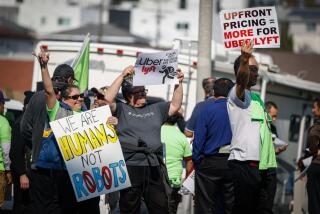Truckers’ Pact Brings Down French Roadblocks
- Share via
PARIS — Employers and the biggest union of French truckers signed a wage accord Friday, virtually clearing the country’s roads of paralyzing roadblocks set up by strikers and defusing what could have become a damaging labor conflict for the Socialist-led government.
Unionized drivers had taken the French economy hostage this week by parking their tractor-trailers across roads, keeping others from making deliveries. The action, which began Sunday night, was so successful that 40% of France’s 18,000 gas stations were partially or wholly dry by Friday morning.
After two days of negotiations in Paris, held under the supervision of Transport Minister Jean-Claude Gayssot, employers offered a 6% raise for long-haul drivers. Raises given in other categories ranged from 3% to 5%.
Some unions loudly complained that it was not enough. But the group representing the most drivers, the French Democratic Labor Confederation, or CFDT, signed the agreement Friday afternoon, calling it realistic.
“Frankly, we have gone as far as possible,” CFDT leader Nicole Notat said. Pursuing the strike further, she said, “would be to risk losing everything.”
By 8:30 p.m., only about 30 roadblocks remained of the 150 that had been in place across the country Friday morning.
The relatively quick and painless end to the dispute, the first major labor-management disagreement to confront Prime Minister Lionel Jospin since his election in June, will be a large feather in his cap.
The strikers’ blockades angered France’s European neighbors, who use French roads to make deliveries of their own goods throughout the Continent. For the first time, other European countries, such as Britain, Germany and Spain, signaled that such obstructionist actions, part of the union culture in France, must come to an end as Europe moves toward closer political and economic union.
Spanish trucking companies alone estimated that the strike cost them $30 million by idling trucks inside Spain or forcing detours around France.
Polled by cellular telephone, CFDT members voted 61.7% in favor of the employers’ offer, union official Joel Le Coq said. Because the union, traditionally close to the Socialists, claims to have organized 80% of the roadblocks, the wind was knocked out of the drivers’ effort to bring the French economy to a standstill.
But bitterness and dissatisfaction were readily apparent at all levels. The No. 2 and 3 unions in the sector, the General Confederation of Labor and Workers Force, refused to sign the deal, as did two smaller unions. The reasons were various but could be summed up thusly: Rank-and-file drivers and their leaders thought they hadn’t gotten enough.
“We’ve spent a week in the cold and rain for nothing,” Kamel Azouz, a striker near Marseilles, said in a television interview. “The bosses have always been the strongest, and that they will remain.”
Gayssot announced that the terms of the deal will be imposed industrywide by a government decree, but Marc Blondel, head of Workers Force, said that “the conflict remains” and predicted another strike next year.
In fact, the four such strikes since 1984 were ended by promises that often were not kept, sowing the seeds of more disputes.
Economy Minister Dominique Strauss-Kahn had said that the French economy, coming out of a long coma, had not yet been harmed by the truckers’ action. But for want of deliveries, many products were running short in many areas of France, and people were stockpiling food and fuel.
For the industry, the wild card is the decision of the 15-nation European Union to open the field to greater inter-European competition next July 1. That means that, for the first time, a German trucking company, for example, will be free to pick up a case of wine in Bordeaux and deliver it to a restaurant in Paris.
More to Read
Sign up for Essential California
The most important California stories and recommendations in your inbox every morning.
You may occasionally receive promotional content from the Los Angeles Times.













